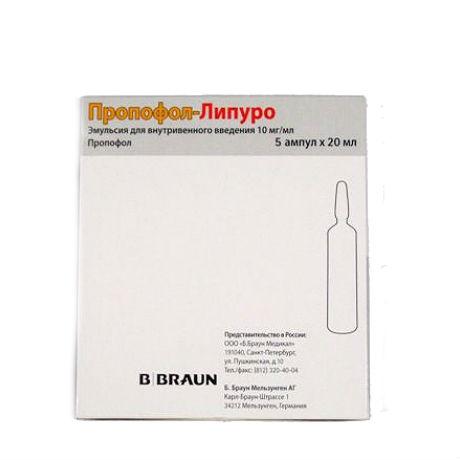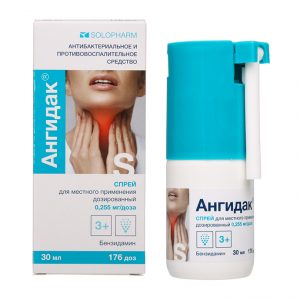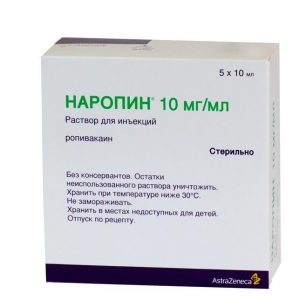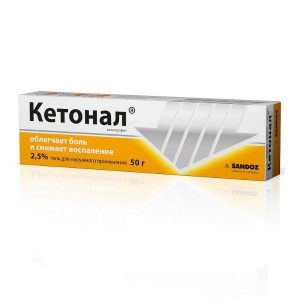Description
Release form
Emulsion for injection.
Packing
5 ampoules of 20 ml.
Pharmacological action
Propofol-Lipuro – a tool for non-inhalation anesthesia.
With iv administration, the state of anesthesia occurs within about 30 seconds, without pronounced signs of arousal.
After administration, propofol is distributed over the tissues of the body, undergoes biotransformation mainly in the liver with the formation of inactive conjugates.
The occurrence of anesthesia under the influence of propofol is apparently due to the nonspecific effect on the lipids of the membranes of the central nervous system neurons, as a result of which the ion channels, in particular the sodium channels, are disrupted. Also shown that under the influence of propofol, GABA-ergic processes in the brain are enhanced.
Propofol has virtually no analgesic effect.
Recovery of functions after the termination of propofol is fast.
Indications
Propofol is used:
in adults and children older than 1 month for general intravenous anesthesia,receiving intensive care and being on mechanical ventilation
in adult conscious, in order to ensure a sedative effect during surgical and diagnostic procedures.
Contraindications
history of allergic reactions to the administration of propofol,
children under 1 month of age,
children and adolescents under 16 years of age (to provide a sedative effect on mechanical ventilation).
Special instructions
With care, propofol is used for concomitant hypovolemia, epilepsy, lipid metabolism disorders, diseases of the cardiovascular system, respiratory system, liver and kidneys, in elderly patients.
To prevent bradycardia, it is advisable to include m-anticholinergic drugs in the premedication complex.
Composition of
1 ml of emulsion contains:
Active ingredient:
propofol 10 mg
Excipients:
soybean oil,
medium chain triglycerides,
glycerin, sodium
.
Dosage and administration of
For introductory anesthesia, adult patients with average body weight are given iv 40 mg every 10 seconds until clinical signs of anesthesia appear. In most cases, the total dose is 2-2.5 mg / kg.
Children over 8 years of age are injected slowly iv until clinical signs of anesthesia appear. The dose should be adjusted in accordance with age and / or body weight, the average dose is 2.5 mg / kg.
For children under 8 years of age, the dose may be higher.
For adults and children older than 3 years with 3 and 4 gradations by ASA, propofol should be administered in smaller doses.
To maintain anesthesia with continuous infusion, adults are given 4-12 mg / kg / h. For children, the rate of administration is 9-15 mg / kg / h.
It is also possible repeated administration in the form of a bolus in doses, necessary to maintain adequate anesthesia.
In order to ensure a sedative effect during mechanical ventilation in adults, propofol is administered at a dose of 300 mcg / kg / h.
Side effects
Rarely: cramps, opisthotonus, pulmonary edema. During awakening, headache, nausea, and vomiting are possible.
In some cases: postoperative fever.
In isolated cases: angioedema, bronchospasm, erythema, sexual disinhibition at doses greater than 4 mg / kg / h, individual cases of rhabdomyolysis have been reported.
Local reactions: phlebitis, thrombosis.
Drug interaction
With the simultaneous use of propofol with muscle relaxants, inhaled anesthetics, analgesics, it is possible to increase the inhibitory effect on respiration, lowering blood pressure, which enhances the effect of propofol.
With the simultaneous use of propofol and opioid analgesics, the risk of respiratory depression increases.
After administration of fentanyl, the level of propofol in the blood plasma may temporarily increase.
Storage Conditions
In a dark place at a temperature not exceeding 25 ° C (do not freeze).
Expiration
3 years.
active substance
Propofol
Terms leave through pharmacies
In retseptu
lekarstvennaja form
Ñmulsyya for infusions
B.Braun Melstungen AG, Germany




